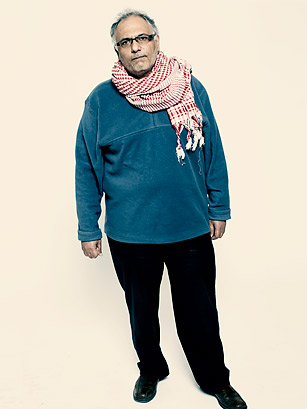
Writer and activist Wael Nawara, 50, is the co-founder of the Ghed (Tomorrow) party, established in 2003. He spoke to TIME's Abigail Hauslohner in Cairo about becoming involved in the protests and his interest in increasing Egypt's exposure to the global economy. Here are excerpts:
TIME: What event made you an activist? What made this a personal thing for you?
Wael Nawara: I was living abroad for some time. And then I was stationed here in the Red Sea for about a year, and this is when I decided to come back to Egypt to try to improve things in some way. I started by focusing on the economic side of things. I went to the U.K. and got an MA in international marketing. By the year 2000, I started feeling that it was useless to work on improving the economy if you didn't have significant legislative political reform, because economic development opens the door to corruption and it becomes impossible to work within the margins of the law because the law is not legitimate. I started writing about this idea of the parallel state — with the failing of the formal state [in health care and the social safety net] where the failings of the formal state gave rise to the parallel state. I think in the end, it was the parallel state that won. For example, in the media, it was the bloggers and Facebook because people lost faith in the state media. We even ended up having a parallel parliament. What made things worse is the [then ruling National Democratic Party] hijacked the EJB — the Egyptian Junior Business Association. I started a political party with a number of my friends from that association, but we met Ayman Nour, who was starting another — al-Ghed — and then we sort of joined forces and worked together ever since.
What was the most memorable moment of the revolution for you?
The whole thing to me is like a series — like a movie. But I think on Feb. 11, in the evening, after Omar Suleiman announced that Mubarak was stepping down, and I saw like 80 million people in the street. And that was comforting. That was a kind of referendum on the revolution after the fact. And people were celebrating — I don't think I've seen Egyptians so happy in my life. People were chanting, "Raise your head up high. You're an Egyptian." To me it was a relief, because I've always felt partially responsible — because if things went bad, then we would have started something that went bad.
What was the most important lesson you learned?
Something I discovered: this collective conscience. We'd never had this huge gathering of hundreds of thousands of people. To have that many and be able to say still that we want this only, and we won't move unless it's fulfilled. And people would go and negotiate with Omar Suleiman and reach a concession and then come back thinking they were big shots and then were forced to recognize the fact that they were not the leaders of the square; and they apologized. People had to realize for the first time that [there were no leaders]. There was a much bigger collective mind in the square, that stretched to Suez and elsewhere. The thing is, people in the square were not watching al-Jazeera until much later.
What was the worst thing you saw during your participation?
The worst thing was on Jan. 28. I was on the Nile. We were caged in [the Boulaq district] for about five hours, and we were gassed continuously. And many people fell, and new people had come from Imbaba [another district]. And these people did not participate in Jan. 25 [the first day of huge protests], so we didn't know what to expect. But they were quite civilized. But after being gassed for so long, they started being violent. And then I was really upset, and this is when I thought that things would get out of hand. They were gassed continuously and then got really angry and started setting things on fire, and I was really sad that this was happening. I think also police brutality was very upsetting. They always take people off the sides [of the crowd], kidnapping them and beating them. Five or six people would be beating one person really brutally. Seeing so many people who fell dead or injured because of attacks was also very disturbing. And I caution everybody in the days to come — when they make a decision — that there are people who die as the result of the protests, that you have to be really sure [of the protests]. I think there was a turn also in the revolution, that some people started just using the revolution for personal glory in a way. But I think also the biggest problem was that [the Supreme Council of the Armed Forces, which currently rules Egypt] lost the confidence and trust of the people quite early on.